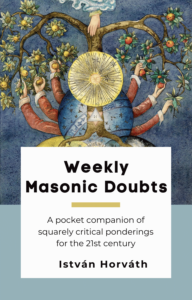As I started to go through the chairs in a lodge working the (Canadian version of the) Emulation ritual – or Work as they call it – I needed to read certain portions of that booklet many times in order to memorize them. Memorizing wasn’t the hardest part of it, though. Actually, the real challenge was finding the “sense” in the complicated sentences, while wondering why it was formulated in that way.
I have spent some time in my professional life with text analysis using different methods and linguistic tools. I was also somewhat familiar with the development of the English language, its history and changes during the centuries. Sometimes, my sceptical opponents dismiss my claim to know anything about the English language, solely based on the fact that I am not a native speaker of this tongue, consequently, I can’t know anything about it. However, being able to speak fluently in a natural way learned from parents and family – conf. mother tongue – and being able to understand how that language works, how it evolved during the past centuries… are two different and distinct things. Never claimed to belong to the first group. And most of my ‘opponents’ don’t belong to the second group, where I definitely have a place for myself.
So repeating the text snippets ad nauseam, the linguist brain starts working, almost subconsciously.
There seems to be a missing conjunction. Here seems to be a later insertion, that doesn’t fit in the general style. This grammatical structure wasn’t widespread at the time of the alleged writing of the text. This word doesn’t make sense in this context.
And the list goes on…
Then there is the long-term memory lane, which comes up with different type of “warnings”: Oh, I remember these symbols and their description from another language, from another ritual, although over there they were at a different point of the ritual, with a different context. Oh, I understand why they say this because I remember the explanation in another language in another ritual… but how will the poor candidate, without that knowledge, be able to understand it? And are my brethren from this jurisdiction understanding it if they only learned it from this version of the work?
These questions running in the head doesn’t put the mind at ease… on the contrary: it is almost a sacrilege assuming that venerable, educated and high ranking Masons might not have the insight that is gained by coming from a different perspective and cultural background. Also, it is almost inconceivable that a foreigner (with his heavy accent) could observe such linguistic and stylistic details in an English text.
So the foreigner begins the research, reads even more ancient texts and old versions of the “Work”, different rituals used in different jurisdictions and puts together the picture, the proverbial big picture about the changes occurred in the texts… which we, allegedly, use in an unaltered form, since times immemorial.

